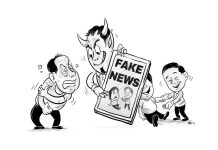
BY NEIL HONEYMAN
CONSTITUTION – a body of fundamental principles or established precedents according to which a State or other organization is acknowledged to be governed. (The New Oxford American Dictionary)
I start from the standpoint that the 1987 Constitution is a sound document and am not sure what changes, if any, are necessary.
For example, there has been discussion recently about the anti-dynasty conditions and whether these need to be changed. Article II Section 26 says: The State shall guarantee equal access to opportunities for public service, and prohibit political dynasties as may be defined by law.
This means that if there are problems associated with consanguinity (relations by blood) and affinity (relations by law), then the law needs to be examined.
There is no magic formula. Our problems will not be solved by having a different government structure. Our problems arise largely due to corruption. If we cannot deal effectively with corruption, then we shall remain a developing, not a developed country.
There is a very strong correlation, by country, in the Transparency International league table between lack of corruption and economic well-being. The Philippines is 111th out of 180 countries. This shows a fairly high degree of corruption. No country below the Philippines can be said to be a developed country. All economically well-developed countries have relatively low levels of corruption, much lower than the Philippines.
The high correlation between corruption and poverty should be addressed. We have signed our support for the United Nations’ Millennium Development Goals (MDGs) but have failed to meet many of these. Specifically, the MDG related to poverty had, as a target, the reduction of poverty by 50 percent between 2000 and 2015. Our poverty level in 2000 was approximately 33 percent. To achieve the goal, therefore meant a reduction to 16.5 percent or below. We are still, in 2018, experiencing a poverty level of around 25 percent.
Phase II of the MDG has, as a target, the reduction of poverty by a further 50 percent between 2015 and 2030. This means that our poverty level in 2030 should be down to 8.25 percent or better. Unless there are dramatic changes in our nation’s culture, this reasonable target will not be met.
Corruption, of course, is not particularly a dynastic issue. Most corruption is between individuals and organizations with no blood ties. A tighter anti-dynasty law, even if implemented properly, will not reduce corruption substantially.
We cannot blame the Constitution for our woes.
Article XI entitled Accountability of Public Officers, if respected by all concerned, would result in low levels of corruption, at least in the public sector. Sections 5-14 address the creation and functions of the Ombudsman. For me, Section 13(7) is key. It says: “(The Ombudsman should) determine the causes of inefficiency, red tape, mismanagement, fraud, and corruption in the Government and make recommendations for their elimination and the observance of high standards of ethics and efficiency.”
The Ombudsman has failed to implement this vital Section.
In contrast, the Corruption Prevention Department of the Independent Commission Against Corruption in Hong Kong has addressed the question of corruption opportunities in all government departments. This partly accounts for the lower level of corruption in Hong Kong.
***
Our Constitution is fine. What is needed is the goodwill and tenacity to implement it properly./PN







